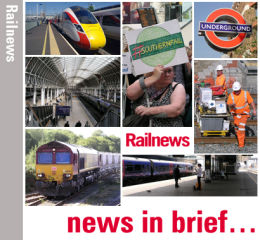Posted 19th June 2019 | No Comments
19 June: news in brief

updated 13.10
Johnson wants independent HS2 review
BORIS Johnson is reported to have modified his previous opposition to HS2. He is no longer saying it that as Prime Minister he would scrap it, but that he would want an independent review of the project. He has told a meeting of Conservative constituency chairs that he has asked former HS2 chairman Douglas Oakervee to carry out the assessment. Mr Johnson told the meeting he had asked Mr Oakervee to ‘have a look at the business case’ for the project and ‘think about whether and how we proceed’. He said it had to be reviewed as costs seemed to be ‘spiralling out of control’. He has also suggested that the spending could be ’reprofiled’ to give Phase 2b to Leeds and Manchester the priority. Transport secretary Chris Grayling has already announced earlier this month that he has asked HS2 chairman Allan Cook to assess whether the high speed lines connecting London, Birmingham and eventually Leeds and Manchester could be built within the existing budget of £56 billion. Mr Grayling said the review of HS2 was ‘to make sure the costs and budget are right and that it is deliverable’.
Diversity gap
ASLEF has launched a new report called ‘On track with diversity’ – which the union said reveals a ‘glaring gap’ between those in the driver's cab at the front of the train and the communities they serve. ASLEF general secretary Mick Whelan said: ‘When I stood up at our annual assembly of delegates – our annual conference – in Leeds last month I was pleased to see how diverse the room looked. Because I have spent 35 years on the railway, and 35 years as an active trade unionist, and I know how many train drivers look just like me. Middle-aged, male, and white. And that’s why I was delighted to see so many young members, women drivers, and black reps at our conference. Because while the trade union movement, historically, has not always been at the progressive cutting edge on some of these issues, this trade union is absolutely committed to equality and diversity in the rail industry. But, as a trade union, we can only recruit, as members, those who have been employed as drivers by the privatised train and freight operating companies. We work with these companies, every day of every week, to ensure they encourage women, as well as men, and black and minority ethnic, as well as white, people to become drivers.’ Figures published by ASLEF say that 6.5 per cent of train drivers are female, that 8 per cent are from an ethnic minority and only 15 per cent are under 35. Mick Whelan continued: ‘We believe that a train driver is a train driver is a train driver – regardless of gender, sexuality, religion, or race – and we’ve been pushing the companies to allow more part-time and flexible working because the lack of such agreements has been a barrier, in the past, to women coming into our industry as many still take on the primary responsibility for child care. And there is, we believe, light at the end of the tunnel. Especially if the recommendations in our report are implemented.’
